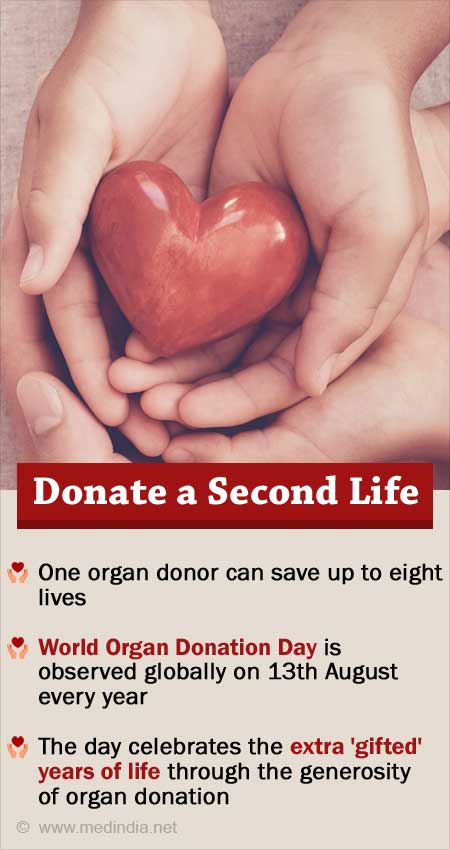World Organ Donation day
 Organ Donation Day is observed every year on 13th of August. Due to lack of awareness, there are myths and fears in peoples’ mind about organ donation. The aim of this day is to motivate normal human beings to pledge to donate organs after death, and to spread awareness about the importance of organ donation.
Organ Donation Day is observed every year on 13th of August. Due to lack of awareness, there are myths and fears in peoples’ mind about organ donation. The aim of this day is to motivate normal human beings to pledge to donate organs after death, and to spread awareness about the importance of organ donation.
Organ Donation is donating a donor’s organs like heart, liver, kidneys, intestines, lungs, and pancreas, after the donor dies, for the purpose of transplanting them into another person who is in need of an organ. The organ donor can play a big role in saving others’ life. The organ of the donor can be transplanted to the patient who needs it urgently.
There are two forms of organ donation, live donations are done with donors who are alive and can donate organs like a kidney and a part of the liver. Human beings can survive with one kidney and the liver is the only organ in the body that is known to regenerate itself, making it possible for these organs to be transplanted while the donor is still alive. The second form of organ donation is known as cadaver donation. In this procedure, after the donor has died, his/her healthy organs are transplanted to a living person.
According to a survey In India every year about: 500,000 people die because of non-availability of organs, 200,000 people die due to liver disease, and 50,000 people die because of heart disease. Moreover, 150,000 people await a kidney transplant but only 5,000 get among them. The organ donor can play a big role in saving others’ life. The organ of the donor can be transplanted to the patient who needs it urgently.
Facts about Organ Donation
- Anybody can be an organ donor irrespective of their age, caste, religion, community etc
- There is no defined age for donating organs. The decision to donate organs is based on strict medical criteria, not age.
- Tissues such as cornea, heart valves, skin, and bone can be donated in case of natural death but vital organs such as heart, liver, kidneys, intestines, lungs, and pancreas can be donated only in the case of ‘brain death’.
- Organs such as the heart, pancreas, liver, kidneys and lungs can be transplanted to those recipients whose organs are failing because it allows many recipients to return to a normal lifestyle.
- Anyone younger than age 18 needs to have the agreement of a parent or guardian to be a donor.

